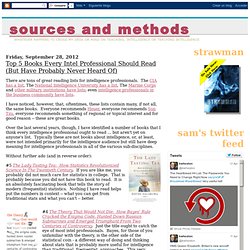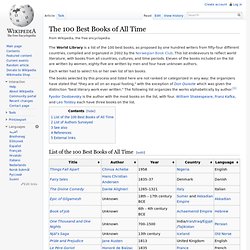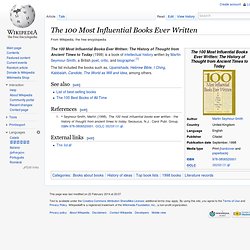

30 Essential Reads for Philosophy Majors. The 10 Books You Absolutely Must Read to Understand the History of Earth. Top 5 Books Every Intel Professional Should Read (But Have Probably Never Heard Of) There are tons of great reading lists for intelligence professionals.

The CIA has a list, The National Intelligence University has a list, The Marine Corps and other military institutions have lists; even intelligence professionals in the business community have lists. I have noticed, however, that, oftentimes, these lists contain many, if not all, the same books. Everyone recommends Heuer, everyone recommends Sun Tzu, everyone recommends something of regional or topical interest and for good reason -- these are great books. Over the last several years, though, I have identified a number of books that I think every intelligence professional ought to read ... but aren't yet on anyone's list. Typically these are not books about intelligence, or, at least, were not intended primarily for the intelligence audience but still have deep meaning for intelligence professionals in all of the various sub-disciplines. Without further ado (and in reverse order): How about you? The Top 10 Banned books of all time - ShortLists.
Beyond Poe: canonical short stories - shortstories literature writing. The Classic, Beautiful and Controversial Books That Changed Science Forever. Book Lists. The Books Project. 75 Books Every Writer Should Read. Whether you want to make writing your career or just want to know how to improve your writing so that you can pass your college courses, there is plenty of reading material out there to help you get inspired and hone your skills.

Here’s a collection of titles that will instruct you on just about every aspect of writing, from the basics of grammar to marketing your completed novel, with some incredibly helpful tips from well-known writers themselves as well. Writing Basics These books address things like structure, plot, descriptions and other basic elements of any story. The Power of Myth by Joseph Campbell and Bill Moyers: You can improve the quality of your writing by adding a mythical quality to them with advice and insight from this book. Writer’s Journey: Mythic Structure for Writers by Christopher Vogler: Whether you agree with the ideas in this book or not, you’ll find it a useful and informative read for writing.
Advice from Authors Improving Your Writing Grammar. 100 Best Books of All Time. The World Library is a list of the 100 best books, as proposed by one hundred writers from fifty-four different countries, compiled and organized in 2002 by the Norwegian Book Club.

This list endeavours to reflect world literature, with books from all countries, cultures, and time periods. Eleven of the books included on the list are written by women, eighty-five are written by men and four have unknown authors. Each writer had to select his or her own list of ten books. The books selected by this process and listed here are not ranked or categorized in any way; the organizers have stated that "they are all on an equal footing," with the exception of Don Quixote which was given the distinction "best literary work ever written. " The following list organizes the works alphabetically by author.[1]
100 Most Influential Books. The 100 Most Influential Books Ever Written: The History of Thought from Ancient Times to Today (1998) is a book of intellectual history written by Martin Seymour-Smith, a British poet, critic, and biographer.[1] The list included the books such as, Upanishads, Hebrew Bible, I Ching, Kabbalah, Candide, The World as Will and Idea, among others.

See also[edit] References[edit] Jump up ^ Seymour-Smith, Martin (1998). The 100 most influential books ever written : the history of thought from ancient times to today. External links[edit] 100 Movies To See. Seven SF novels for radicals, utopians, and dreamers. So what is SF?

Partially a hazy roadmap, partially a utopian dream, and very often a mirror of present conditions, the genre resists settled categorisation just as it resists elevation to the hallowed heights of literary fiction. Where to start? 1) Kim Stanley Robinson’s Mars series. The three books, Red Mars, Green Mars and Blue Mars articulate a vision of a future well informed not only by possible technological progress but by history, sociology, and politics. Poetic and evocative, they are well worth a read by anyone wishing to give texture to their dreams of space. 2) Ken MacLeod’s Fall Revolution Series, particularly The Star Fraction, The Stone Canal and The Cassini Division. 3) Iain M.
The Culture novels are best described as a cross between an anarcho-syndicalist post-scarcity utopia, and a liberal utopia and mirror of the Now. 4) Ursula K. 5) Francis Spufford’s Red Plenty. 6) The Strugatsky brothers’ Roadside Picnic. 7) Octavia Butler’s Parable of the Sower. And here we are. 10 Science Fiction Novels You Pretend to Have Read (And Why You Should Actually Read Them)